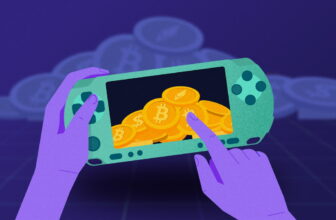
As we hurtle into the ever-evolving landscape of technology, the realm of digital gaming stands at the forefront of innovation and boundless possibilities. With virtual reality, augmented reality, cloud gaming, and artificial intelligence becoming increasingly integrated into the gaming experience, one can’t help but wonder: what does the future hold for this thriving industry?
Will we see a seamless blend of physical and digital worlds that redefine how we perceive entertainment? Or perhaps witness the emergence of fully immersive experiences that blur the lines between reality and fantasy? The future of digital gaming is not just a question of advancements in hardware or software; it’s about exploring uncharted territories where creativity knows no bounds and imagination takes flight in ways unimaginable
Table of Contents
What Is Digital Gaming?

Source: freepik.com
In the ever-evolving landscape of entertainment, digital gaming has emerged as a powerhouse, captivating audiences across the globe with its immersive experiences and advanced technologies. Unlike traditional forms of slot online gaming, digital gaming transcends physical limitations by allowing players to enter virtual worlds where creativity knows no bounds. From action-packed adventures to strategic puzzles, gamers can engage in a wide array of genres that cater to diverse tastes and preferences.
With the rise of online multiplayer capabilities and social interaction features, digital gaming has transformed into a dynamic social platform where individuals from different corners of the world can connect and collaborate in real time. This interconnected nature not only fosters camaraderie among players but also opens up avenues for teamwork, competition, and shared experiences.
As technology continues to advance at an unprecedented pace, the future of digital gaming holds boundless potential for innovation and exploration, paving the way for new dimensions of storytelling and interactivity that will continue to redefine the way we play.
Current Trends in Digital Gaming
One of the current trends in digital gaming that is gaining significant traction is the rise of mobile gaming. With more powerful smartphones and tablets being released each year, mobile games are becoming increasingly complex, immersive, and visually stunning. This shift has democratized gaming, allowing players to access high-quality games on the go.
Another trend shaping the digital gaming landscape is the surge in popularity of esports. Competitive gaming tournaments are now filling arenas with dedicated fans cheering on their favorite teams and players. The esports industry is rapidly growing, with investments pouring in from sponsors, advertisers, and media companies looking to capitalize on this rapidly expanding market.
Emerging Technologies in The Gaming Industry

Source: freepik.com
In the rapidly evolving landscape of digital gaming, emerging technologies are shaping the future of the industry in exciting ways. One such technology is cloud gaming, which allows players to stream games from remote servers without needing high-end hardware. This not only enhances accessibility but also opens up new possibilities for cross-platform play and multiplayer experiences.
The Rise of Mobile Gaming
Mobile gaming has seen a meteoric rise in recent years, reshaping the landscape of digital gaming as we know it. With the convenience of smartphones and tablets, millions of users worldwide are now carrying an entire gaming library in their pockets. This accessibility has democratized gaming, allowing players of all ages and backgrounds to easily immerse themselves in virtual worlds and connect with others in real-time.
Moreover, the evolution of mobile technology has brought about stunning advancements in graphical quality and gameplay mechanics on par with traditional console and PC games. The success of popular titles like PUBG Mobile and Fortnite have proven that mobile platforms are more than capable of delivering high-quality experiences that rival those found on larger devices.
As smartphones continue to become more powerful and affordable, the future of digital gaming seems increasingly intertwined with the mobile space, promising even greater innovations yet to come.
Virtual Reality and Augmented Reality Games

Source: freepik.com
Virtual reality (VR) and augmented reality (AR) games have introduced a new dimension to the gaming world, allowing players to immerse themselves in unique digital environments. The interactive nature of these technologies blurs the lines between the physical and virtual worlds, providing an unparalleled level of engagement for gamers. With advancements in VR headsets and AR devices, the potential for creating truly lifelike and interactive gaming experiences is expanding rapidly.
One of the key aspects driving the popularity of VR and AR games is their ability to transport players into fantastical realms where they can interact with characters and objects in ways previously unimaginable. This technology has immense potential not only in entertainment but also in education, training simulations, and even therapy.
As developers continue to push boundaries with innovative concepts and designs, we can expect VR and AR games to become increasingly sophisticated, captivating audiences across all demographics. The future of digital gaming is undoubtedly intertwined with the evolution of virtual reality and augmented reality technologies.
E-Sports and Competitive Gaming Scene
The e-sports and competitive gaming scene is rapidly evolving, drawing in a diverse range of players and spectators from all over the world. With professional matches streamed live on platforms like Twitch and YouTube, the audience for competitive gaming continues to grow exponentially. What was once considered a niche market has transformed into a multi-billion dollar industry with major sponsorships, lucrative prize pools, and international tournaments that rival traditional sporting events in terms of viewership.
As technology advances and gaming becomes more mainstream, the boundaries between virtual competition and real-life sports blur. E-sports athletes are now regarded as celebrities, with fan bases that rival those of traditional sports stars. The competitive gaming landscape is constantly changing, with new games entering the scene each year while older titles fade into obscurity.
As we look towards the future of digital gaming, it’s clear that e-sports will play an increasingly important role in shaping how we consume entertainment and engage with one another in an ever-connected world.
Potential Impact of AI on Gaming

Source: freepik.com
As we dive deeper into the realm of artificial intelligence (AI) and its integration into gaming, the potential impact on player experience is nothing short of revolutionary. AI algorithms can analyze player behavior in real time, offering personalized challenges and adaptive difficulty levels. This means no two gaming experiences will be the same, creating a dynamic and immersive environment that keeps players engaged for longer periods.
Furthermore, AI can enhance storytelling in games by generating unique narratives based on player choices and interactions. The traditional linear narratives could soon be replaced by complex branching storylines that react to every decision made by the player. This level of customization not only elevates the overall gaming experience but also blurs the lines between reality and virtual worlds, opening up new dimensions for exploration and creativity within digital game environments.
Conclusion: The Future of Digital Gaming
As we look to the future of digital gaming, one thing is clear: the industry is only going to continue growing and evolving. With advancements in technology such as virtual reality, augmented reality, and cloud gaming, players can expect a more immersive and seamless gaming experience. The boundary between reality and the virtual world will blur even further, offering gamers unprecedented levels of escapism and engagement.
Moreover, the rise of mobile gaming has democratized access to games, making it easier for a wider range of people to enjoy gaming on-the-go. This trend is expected to continue expanding as smartphones become more powerful and affordable.
Additionally, with the increasing popularity of esports and live-streaming platforms like Twitch, the future of digital gaming also holds promising opportunities for professional gamers and content creators looking to make a career out of their passion. In conclusion, the future of digital gaming seems bright with endless possibilities waiting to be explored and experienced.







